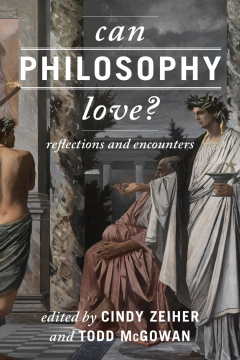
Additional Information
Book Details
Abstract
How can we articulate a philosophy of love? This volume stages encounters between contemporary understandings of love and philosophy. It considers particular continental philosophers who think about love and its relation to desire and sexuality.
The essays in this collection contend with philosophy and psychoanalysis as lines of thought that expose love’s role in all knowledge. Drawing on the work of key thinkers such as Žižek, Badiou, Lacan, Hegel, Vattimo, Caygill, Levinas, Menshikov and Marx, this book puts love to work as a way of understanding the subject of desire as a figure of knowledge shaped by the event of love.
Socrates famously maintained that all he knew was that he knew nothing – except in the matters of love. But can love be a matter of proper knowledge, or is love the one thing that ultimately defies knowledge? After 2500 years of philosophical rumination on love after Plato’s Symposium, can philosophy say something new about love? The essays of the present volume, ranging from Plato to 9/11, from mysticism to Badiou, from Hegel to Lacan, from Rousseau to Levinas, from Kierkegaard to Malevitch, from politics to popular culture, passionately engage with this most praised and most enigmatic of all signifiers, and they succeed, between them, with the most difficult feat: to produce novelty and surprise.
Mladen Dolar, Senior Research Fellow, Department of Philosophy, University of Ljubljana
Why can't the question, "What is love?" be put to rest? This is the real question addressed by this fascinating collection, the persistent provocation that permits it to open new ground. It is often said that questions are more interesting than answers; in this case, the answers could not be more compelling.
Joan Copjec, Professor of Modern Culture and Media at Brown University
Todd McGowan is a Professor in the Department of Film and Television Studies at the University of Vermont. His many publications include Capitalism and Desire: The Psychic Cost of Free Markets (2016) and Enjoying What We Don’t Have: The Political Project of Psychoanalysis (2012).
Cindy Zeiher is a Lecturer in the School of Language, Political and Social Sciences at the University of Canterbury, Christchurch, New Zealand. She is co-editor of the journal CT&T: Continental Thought and Theory.
Much of the greatest energy and creativity of contemporary Continental philosophy and the theoretical humanities is situated at the intersection of German idealism, Marxism, and psychoanalysis. This superb collection brings together contributions by some of the leading representatives of this new philosophical constellation. Moreover, it addresses one of the biggest and most difficult perennial questions that anyone who thinks cannot avoid asking: What is love? The contributors’ brilliant essays address amorous matters from Hegelian, Marxian, and Lacanian angles, shedding light both on love itself as well as on the intellectual orientations deployed to analyze it. Nobody interested in either love or today’s theoretical avant-garde can justify ignoring this book.
Adrian Johnston, Professor and Chair, Department of Philosophy, University of New Mexico
A truly remarkable and inspiring collection of essays on topics situated at the intersection between philosophy and psychoanalysis, and leading to a wide range of various further interrogations, including politics. Can Philosophy Love? is simply a must!
Alenka Zupančič, Professor of Philosophy and Psychoanalysis, The European Graduate School
Table of Contents
| Section Title | Page | Action | Price |
|---|---|---|---|
| Can Philosophy Love? | Cover | ||
| Contents | v | ||
| Acknowledgements | ix | ||
| Introduction: Can Philosophy Love? | xi | ||
| Part I: Love, Hegel and Lacan | 1 | ||
| 1 Hegel in Love | 3 | ||
| 2 Towards a Limitless Love or Mystical ‘Jouissance of Being’ | 27 | ||
| 3 On the Tendency to the Debasement of the Universal in the Sphere of Love | 55 | ||
| 4 L-D-L’, or: Lacan’s Dialectics of Love (in Loveless Times) | 67 | ||
| 5 Love, the Lack Thereof | 87 | ||
| 6 Love-Life | 105 | ||
| 7 Love and the Apparatus: On a Hegelian Fragment | 119 | ||
| Part II: Love and Politics | 133 | ||
| 8 Against Love as a Political Category | 135 | ||
| 9 Ideological Love: The Return of Russian Conservative Thinkers of the Fin-de-siecle | 147 | ||
| 10 Towards a Politics of Love by Way of Resistance | 163 | ||
| 11 Politics, Solidarity and the (Dis)Location of Love | 175 | ||
| Part III: Love as Cultural and Mythical Concern | 191 | ||
| 12 Cordelia’s Kiss | 193 | ||
| 13 Love and Surveillance: Reformulating the State Gaze in the ‘Age of 1984’ | 207 | ||
| 14 Love’s Intermediary: The Aesthetics of Rousseau’s Amour de Soi | 221 | ||
| 15 The ‘Endless Space between Words’: Desire, Fantasy and Interface in Her | 241 | ||
| Part IV: Love, Logic and (Impossible) Demand | 253 | ||
| 16 On Why Love Is a Black Square on a White Square or Badiou on Love | 255 | ||
| 17 Weak Love? 17 Propositions | 269 | ||
| 18 Beyond Narcissism: Emmanuel Levinas and ‘the wisdom of love’ | 281 | ||
| 19 Struggle as Love Par Excellence: Zupančič avec Badiou | 297 | ||
| Index | 311 | ||
| Notes on Contributors | 319 |
